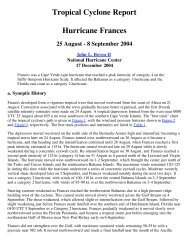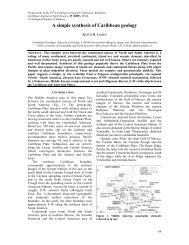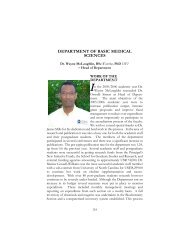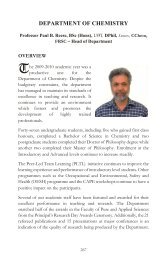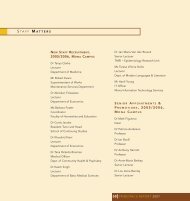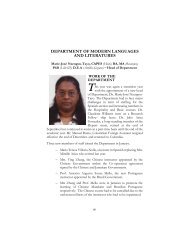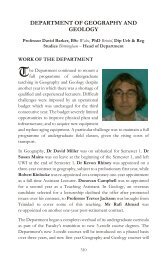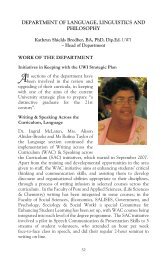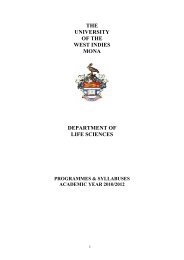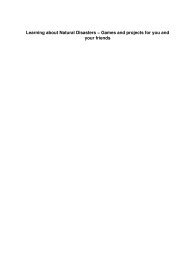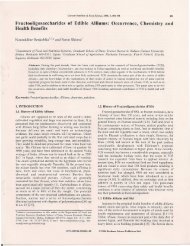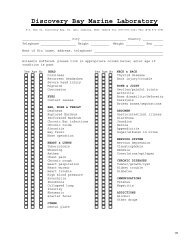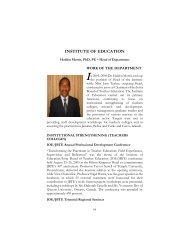Medical Sciences - University of the West Indies
Medical Sciences - University of the West Indies
Medical Sciences - University of the West Indies
You also want an ePaper? Increase the reach of your titles
YUMPU automatically turns print PDFs into web optimized ePapers that Google loves.
FACULTY OF MEDICAL SCIENCES<br />
demography are addressed in this course.<br />
PUBH 6202 (HE62B) Epidemiology II (2 credits)<br />
Details methodological issues in epidemiology including<br />
measurements, rates, risk, study designs<br />
and statistical methods and <strong>the</strong>ir value in <strong>the</strong> prediction<br />
and management <strong>of</strong> illnesses and diseases.<br />
PUBH 6203 (HE62C) Infectious Epidemiology<br />
(2 credits)<br />
Describes and outlines principles <strong>of</strong> prevention and<br />
control <strong>of</strong> communicable diseases with special emphasis<br />
on diseases <strong>of</strong> particular significance to <strong>the</strong><br />
Caribbean. Disease control programmes and associated<br />
problems are analyzed and <strong>the</strong>ir impact assessed<br />
and debated.<br />
PUBH 6204 (HE62D) Chronic Disease<br />
Epidemiology(2 credits)<br />
Provides overview <strong>of</strong> major non-communicable and<br />
chronic diseases prevalent in <strong>the</strong> Caribbean. Related<br />
risk factors and methodologies, compliance<br />
problems, nutrition and o<strong>the</strong>r issues and <strong>the</strong>ir implications<br />
for Health Education and Health Promotion<br />
are discussed. Delineates approaches for chronic<br />
non-communicable disease reduction and control.<br />
PUBH 6301(HE63A) Family Health I (2 credits)<br />
Focuses on <strong>the</strong> concepts, content and approaches<br />
to <strong>the</strong> provision <strong>of</strong> health care services for families<br />
throughout <strong>the</strong> life cycle. Discussions though centered<br />
around Caribbean issues are pertinent to<br />
global situations. There is a focus on <strong>the</strong> application<br />
<strong>of</strong> those principles to real families in <strong>the</strong> community<br />
through case studies and working with families at<br />
risk.<br />
PUBH 6302 (HE63B) Family Health II (2 credits)<br />
Reinforces <strong>the</strong> concepts, content and approaches<br />
to <strong>the</strong> provision <strong>of</strong> health care services for families<br />
throughout <strong>the</strong> life cycle as covered in Family I. Contemporary<br />
issues affecting <strong>the</strong> family including violence<br />
and rape are dealt with, not only from a <strong>the</strong>ory<br />
based perspective but course participants access<br />
and utilize state and community agencies to improve<br />
<strong>the</strong> health and welfare <strong>of</strong> <strong>the</strong> families with which <strong>the</strong>y<br />
work. Capacity and asset building skills for empowerment<br />
are taught.<br />
PUBH 6401 (HE64A) Health Management I<br />
(2 credits)<br />
Involves didactic exploration and critique <strong>of</strong> <strong>the</strong><br />
health management process including general and<br />
social systems <strong>the</strong>ory, health service structure and<br />
function (national and international) and <strong>the</strong> major<br />
steps in <strong>the</strong> planning process.<br />
PUBH 6402 (HE64B) Management II (2 credits)<br />
Builds on concepts covered in Health Management I<br />
by delving into issues relating to policy, planning and<br />
health sector reform. Participants critically analyze<br />
GRADUATE STUDENTS INFORMATION GUIDE 2011/2012 40



